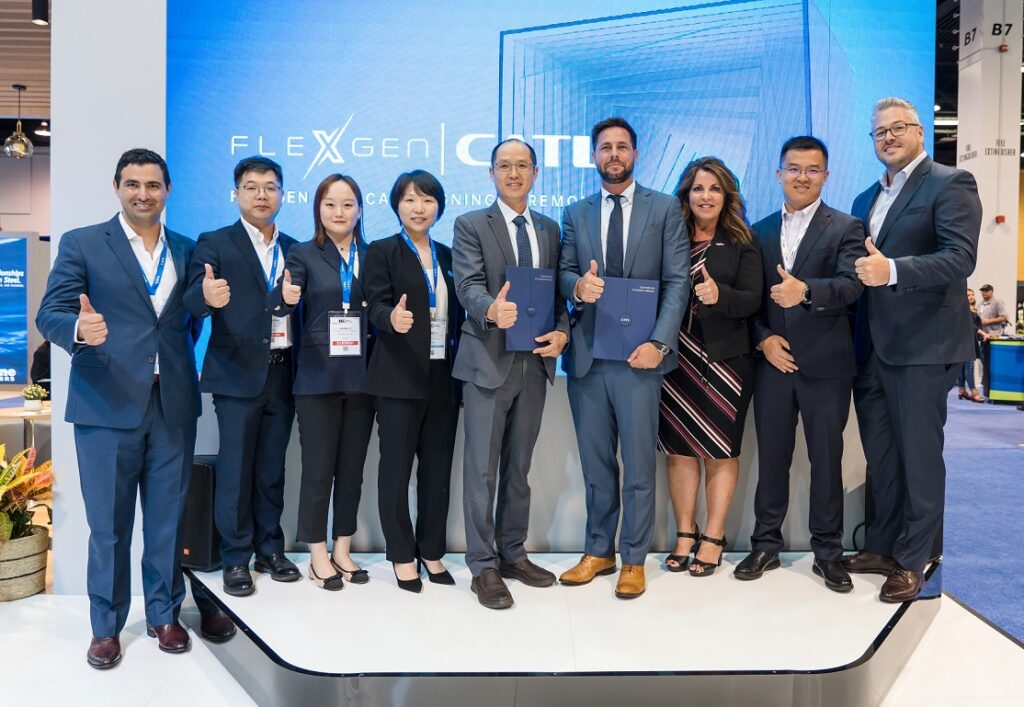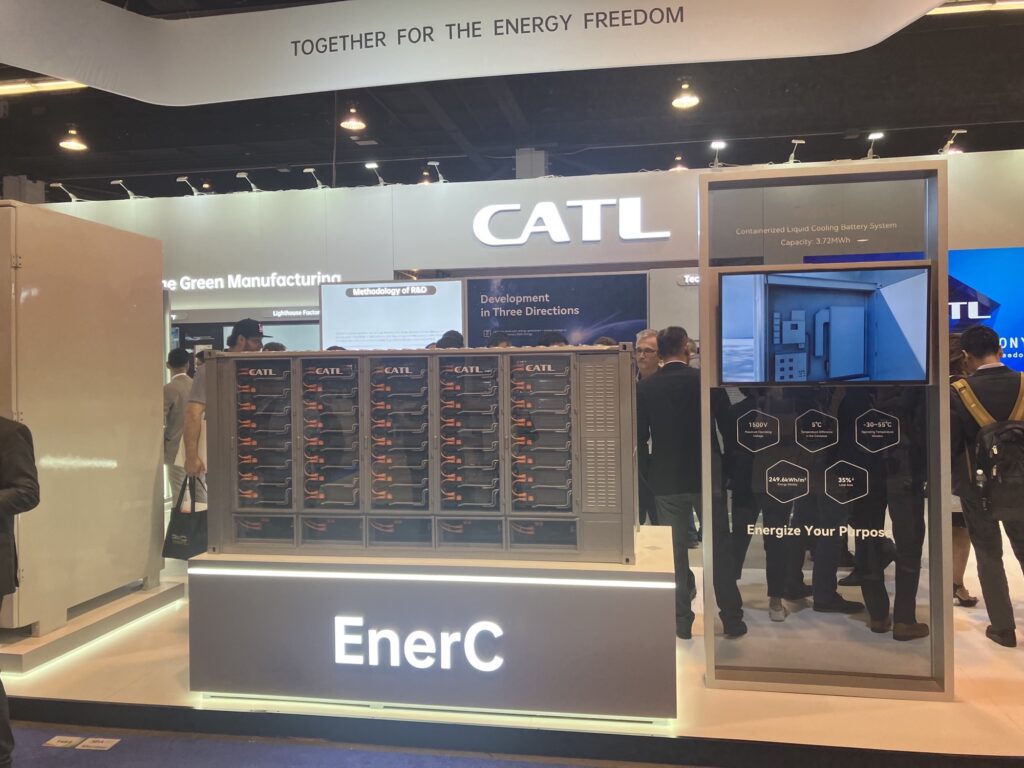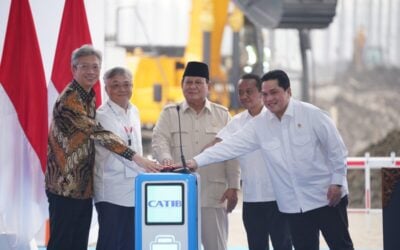
Energy storage system integrator FlexGen signed a multi-year, 10GWh battery storage supply deal with CATL, the world’s biggest lithium-ion manufacturer a couple of weeks ago.
Energy-Storage.news was on hand as the deal was signed live at RE+ 2022, the solar PV and energy storage trade event which took place in Anaheim, California.
Enjoy 12 months of exclusive analysis
- Regular insight and analysis of the industry’s biggest developments
- In-depth interviews with the industry’s leading figures
- Annual digital subscription to the PV Tech Power journal
- Discounts on Solar Media’s portfolio of events, in-person and virtual
FlexGen CEO Kelcy Pegler and CFO Yann Brandt spoke to the site at the show and offered insights into the three-year supply agreement, which although sizeable will be “absorbed into” FlexGen’s pipeline of North American projects with “reasonable ease”, according to Pegler.
CATL is going to supply its EnerC containerised liquid cooling battery energy storage system (BESS), which was among the range of everything from cell to pack to complete system the Chinese manufacturer was exhibiting at the show.
EnerC comes with IP55 and C5 anti-corrosion protection and can fit up to 259.7kWh of battery storage into a square metre footprint for an expected 20-year lifetime.
FlexGen will use the systems for a variety of utility, municipal and cooperative customers as well as for battery asset owners participating in merchant market opportunities, building on a relationship that has already seen the system integrator use CATL equipment at more than 2.5GWh of projects already.
The scale as well as the quality of CATL’s products were exactly what the energy storage company and its customers needed, FlexGen CFO Yann Brandt told Energy-Storage.news.
“For us, what makes the most sense is to go directly to the source of who has the largest manufacturing capacity in the world, and quite frankly was the most bankable. There’s probably a set of five companies that would go into this most bankable category,” Brandt said.
CATL is one of the few big battery making companies with dedicated capacity serving the stationary energy storage market. As noted in our coverage as the deal was signed, that presented an opportunity for FlexGen to rise above the crowd of BESS integrators scrambling for a share of a supply chain mostly geared towards electric vehicles (EVs).
Supply chain constraints experienced in the battery sector today are “crazy,” Brandt said, with a lot of developers seeing that they need to be looking a few years ahead to have a chance of securing the components they need.
During the RE+ show, FlexGen heard repeatedly that customers didn’t know how to procure batteries at this challenging point in time.
“Remember, this industry, everyone here is competing against Detroit, against the auto industry; they’re willing to buy every battery that’s made.”
CEO Kelcy Pegler said that the industry is increasingly dividing into “haves and have nots” when it comes to battery supply, with the CATL deal putting FlexGen’s customers “into the have column”.
“CATL’s commitment to battery storage was on the forefront of our attraction to this partnership,” Pegler said.

One overarching positive for the US industry – and for the clean energy industries and pro-climate movement in general – has of course been the Inflation Reduction Act (IRA), which includes tax incentives that many agree will turbocharge battery storage deployment levels.
That will stimulate demand to the extent that some have predicted a doubling of forecasted energy storage deployments, but that also means that until more battery raw materials extraction, processing and manufacturing come online, the scramble for cells will likely intensify.
“The battery storage market had a lot of momentum [already] before the IRA. I think the IRA took a lot of yellow light projects and made them glaringly green. We’ve seen many of our customers come with projects that have now grown to portfolios,” Pegler said.
“This agreement allows everyone to plan more transparently together, not just for this quarter or this year, but through that portfolio visibility of several years.”
The need for certainty in planning and investing was a theme that came up often during conversations and presentations at RE+ 2022. Pegler said that on FlexGen’s side, the company has “really made an effort to be bankable,” raising US$250 million investment in the past year or so.
FlexGen also brings to the table its HybridOS software platform, controls and energy management system (EMS), through which the company delivers its value proposition: “turning batteries on and keeping them on,” as Pegler and Brandt both describe it.
Pegler said that FlexGen’s capabilities have been earned from 12 years of field deployments, with much of that time spent working on bespoke projects that were the first of their kind.
“As a result of that history, we’re really good at making sure the batteries work within the plans that you had, and within the deviations that will exist because of the dynamic market conditions that we’re in the midst of,” the CEO told Energy-Storage.news.
“Batteries at their core can only do two things: you can charge them, and you can discharge them. But as a result of doing that efficiently, you have access to a whole slew of revenue generating opportunities, and that’s where HybridOS thrives.”
FlexGen is technology neutral in its approach to batteries, Yann Brandt said, and the company has worked with “a lot of battery manufacturers”. CATL was able to meet FlexGen’s requirements on price, bankability and availability of supply.
“The scale of manufacturing, the quality of manufacturing, and now the ability for us to programmatically put, to continuously bring supply into the country and to our projects, kind of ties the bow,” Brandt said.
The deal took about a year to come together, according to the FlexGen CFO. The system integrator is also an Authorised Service Provider for CATL systems, taking responsibility for operations and maintenance (O&M), which unlocks access to an expanded service network across the US.






